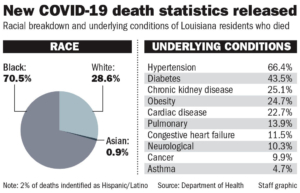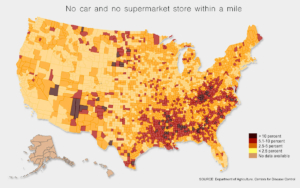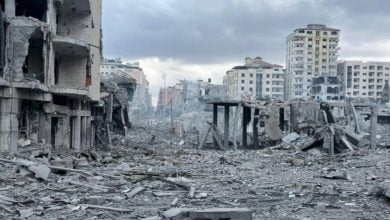As the COVID-19 pandemic continues to sweep across the United States, the deadly disease looms large over one of the poorest and most health burdened regions of the country: the South. While epicenters of the pandemic like New York City weather through the worst days and weeks of the outbreak, public health officials warn that many Southern states will not see their peak until later in the month of April.
In Southern cities, new cases and deaths from the virus are increasing rapidly, particularly in long term care centers and nursing homes. New Orleans has begun to emerge as another epicenter of the crisis, with the state of Louisiana already reporting 18,283 cases and 702 deaths. In Georgia, where an outbreak in the city of Albany gained national attention, 10,885 cases have been reported and 412 have died.
Southern workers have had to wrestle even the most basic precautions from the hands of both Democrat and Republican state government officials. Almost every southern state has been extremely late to issue much needed stay at home orders.
As a result, many “non-essential” workers were forced to dangerously remain on the job as the pandemic raged throughout the country. It was only after the backlash it faced alongside the “big three” U.S. automakers, and pressure felt by South Carolina officials, that the auto barons of BMW decided to reverse the requirement that the 12,000 workers at their Spartanburg, South Carolina plant continue coming to work. In Arkansas, where a stay at home order has still yet to be put in place, over half a million workers still report to work every day.
It took Georgia Gov. Brian Kemp until April 3 to issue a stay at home order. He justified his inaction by falsely claiming that he had not been made aware of “new data” which showed individuals could spread the virus without showing any signs of symptoms. However, health officials have known of asymptomatic transmission for months and consistently warned state officials of the necessity of such measures. It is clear the capitalist class would prefer to squeeze every last drop of profits out of the working class that it possibly can before taking much needed preventative measures— even if it means deadly surges spreading across the South like those we have already seen in New York City.
Prior to the COVID-19 pandemic, a massive wave of hospital closures was seen across the South after many state governments refused to expand Medicaid insurance under the Affordable Care Act, leaving many hospitals in economic ruin. This has especially been the case in Mississippi, Tennessee and Alabama, where the number of hospital closures in the last 10 years is in the dozens. Many of these hospitals, which were responsible for serving some of the poorest and most oppressed communities, remain closed in spite of a global pandemic, and few in government are calling for their return. In Mississippi, it’s been reported that even before the coronavirus pandemic, almost half of all the state’s rural hospitals were on the verge of financial collapse. The enormous cost of ventilators, masks and medical staff needed to treat the pandemic will only further plunge the region’s hospitals into debt and financial ruin.
Crisis unmasks capitalist underdevelopment

On top of severe shortages and the weak and neglectful responses from rightwing state and local governments, a mountain of other factors point toward the potentially uniquely disastrous spread of COVID-19 in the South. The region is known for its higher rates of heart disease, diabetes, hypertension, asthma and other health issues. Thus an infectious disease which has proven to prey on these underlying health conditions represents a unique threat.
A shocking report from the Louisiana Department of Health on the state’s coronavirus deaths on April 9 revealed that Black patients accounted for 70 percent of all the state’s deaths from COVID-19. Of those deaths 66 percent had been previously diagnosed with hypertension, 43 percent with diabetes, and many more with other underlying health conditions.
In Mississippi the statistics are similar, with Black residents accounting for 72 percent of the state’s recorded deaths from the virus. Even without COVID-19, Mississippi consistently has the highest recorded death rates from the flu virus in the nation every year. This current flu season has followed the same pattern, further debilitating the state’s capacity to deal with a rapidly expanding coronavirus pandemic.
Few would deny that the South is particularly vulnerable as COVID-19 continues to spread because of the widespread prevalence of pre-existing conditions and lack of health care coverage. It is impossible, however, to understand this unique threat without looking at the serious social and economic implications faced by Southern workers and oppressed communities in particular. The coronavirus crisis has laid bare the health consequences of the grinding poverty, drastic food deserts, lack of fresh and nutritious food, lack of health care coverage, environmental degradation and the dismissive and racist abuses inside the healthcare system faced by poor and working class communities. It paints a picture of the U.S. South as an oppressed and super-exploited region, which also faces other sinister, man-made diseases: racism and its parent, capitalism.

Lack of fresh and nutritious food are linked to hypertension and diabetes. An estimated 24 million people in the U.S., a majority of them in Southern states, live in food deserts, or areas with extremely limited access to fresh and nutritious food.
Far from being caused by scarcity, food deserts exist amid a rich and expanding agribusiness sector. Working class people in the South are denied access to fresh food simply because they can’t afford it. With each passing day of the pandemic, it becomes clear to many that the greatest “underlying conditions” impacting the health of the Southern working class are poverty and exploitation.
Studies have shown that for many, the prolonged mental and physical stress or anxiety related to poverty can cause physical health to deteriorate. For the thousands of families who are one missed paycheck away from homelessness or starvation, this is undoubtedly the result. This is only reinforced by the life-long exposure of many children and youth to the violence, addiction, unsanitary housing conditions and broken down schools and health care infrastructure found inside so many working class communities.
The present crisis reveals the reality of the dictatorship of the rich, and raises for millions the imperative need for a mass movement for revolutionary change. The capitalists and their government have proven completely unwilling to utilize the massive wealth of society, created by the workers, to bail out the people even in a time of such unprecedented crisis as we are in now. They are far more content to flee in droves to their luxurious vacation homes and resorts, money bags in hand, as the crisis is pushed onto the backs of the poor and working class.
We need a new system, a socialist system, where the long term health and well being of the people no longer takes a back seat to the profits of the rich. Such a system is within reach— if we fight for it.






